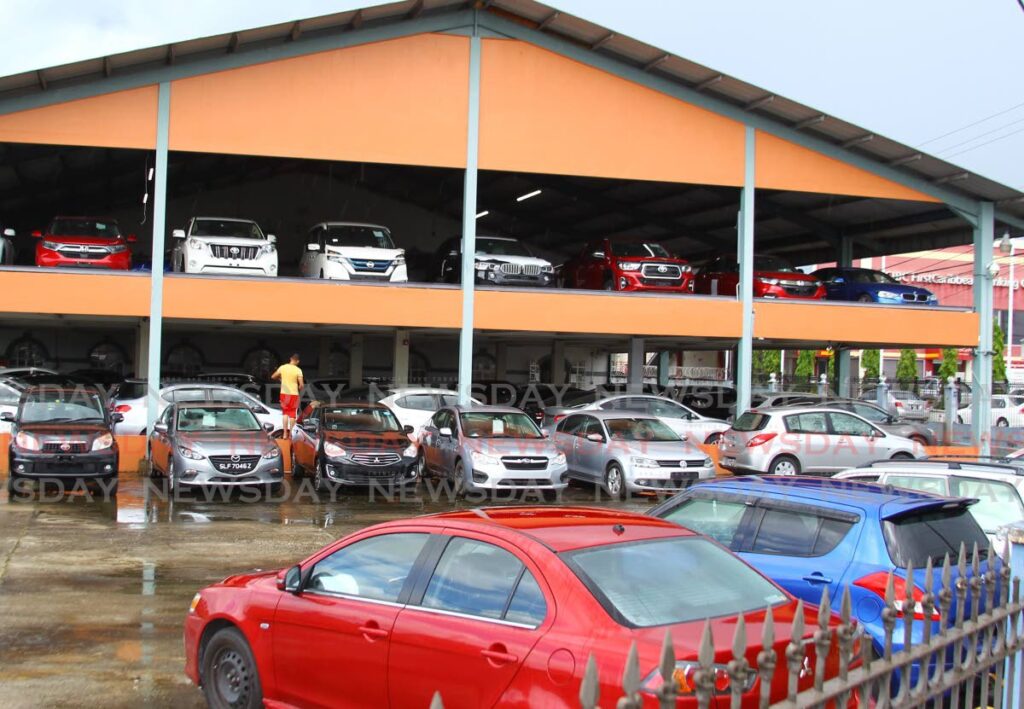Automotive dealers happy for notice but...'used car industry remains in tatters'

RHONDALL Feeles, vice president of the TT Automotive Dealers Association, has commended the Ministry of Trade and Industry for notifying used car dealers and especially personal importers that import licences issued this year will not be revalidated for vehicles arriving after December 31.
Speaking with Newsday on Wednesday, Feeles said the notice issued the previous day will save individual importers considerable inconvenience and expense.
A similar notice was issued last year, but many importers were still caught out, expecting import licences to be revalidated for vehicles arriving after December 31, which had previously been common practice but not official policy.
"There should (still) be a grace period," Feeles said, "because this year in particular, shipping has been horrendous."
"However, it is good to see that they have notified people, particularly the personal importers, because we, the dealers, we understand this has happened last year and were expecting it again this year."
But Feeles said the complete discontinuance of licence revalidation has had a tremendous negative impact on the industry, which has faced many other challenges in recent years.
"I do believe it is something that has caused a bit of trauma," he said.
"(At the end of) last year, it did traumatise a lot of dealers, literally, because a number of them and personal importers...would have imported vehicles that landed in January, and many of them would have been caught up with the vehicles getting more or less stagnant on the port and (not being) cleared.
Feeles said he is certain the ministry began issuing the notices about the discontinuation of revalidation of licences over the past two years after a number of importers took legal action when they were unable to clear their vehicles at the port, leaving them with hefty storage fees, which cost about $200-$300 per day.
"Sometimes you buy a car (and) after clearance and registration (you expect) to spend however many thousands and you have to pay more than that in storage fees.
"It's almost like $6,000 per month per car, so when that stays on the port for five months, you're looking at $30,000."
The ministry first stopped revalidating licences without notice around the time when the permissible age for imported used vehicles was reduced, Feeles said, and importers were told to apply for clearance. But the matter would be dealt with on a case-by-case basis.
"So by the time they got to your case, it could have taken four, five, six months, for some people even a year, I imagine, as well."
While storage fees are sometimes waived the importer must prove that an agency such as Customs was responsible for the delay in clearance.
The ministry "would say that revalidation is not guaranteed. There is no policy that they have to revalidate, and based on that premise, the revalidation is something they would say that they just did to accommodate."
In its notice on Tuesday, the Ministry of Trade also reiterated that the permissible age for the import of used right-hand-drive sedans, station wagons and SUV is three years from the date of manufacture for vehicles with a gasoline, diesel, CNG or hybrid engine; and two years from the date of manufacture for vehicles outfitted with an electric motor powered by a rechargeable battery pack.
Feeles said this, too, has had disastrous repercussions for dealers and by extension customers, who now pay far more for imported vehicles, through no fault of the importers.
"We're talking about three years' permissibility. (The industry) is not at a place that makes the vehicle affordable to the target group which this industry was created for.
"You see, people see the prices escalate and they think it's because of the dealers. It's not because of the dealers," he said.
"As you see the age of importation decrease, you're going to see the cost of cars increase because you're buying a newer car."
For example, Feeles said some potential customers might mistakenly compare the price of a six-year-old Nissan Note sold in 2015 for $60,000-$65,000 to a three-year-old model that sells now for close to $100,000.
"Just a simple adjustment from three to five (years), and you can see the price of cars plummet, plummet by $20,000-$30,000."
He said he has the evidence and statistics to show correlation between the reduction in the permissible age of imported cars and the decline in sales.
He said among the challenges importing vehicles was a reduction in the number of vessels used to import vehicles.
"Due to the impact of covid, a lot of the suppliers had challenges to have vehicles shipped because a lot of the lines, from what we were informed, sold their vessels because of the stagnant economy in the years gone by. So there were fewer vessels this year."
Most dealers were only able to import between 30 and 50 per cent of their normal capacity because of issues with shipping, he said.
Feeles said the association has also lobbied the ministry for the removal of taxes on hybrid and electric cars.
"We told (the ministry) if you bring hybrid cars and remove the taxes, it will become cheaper, but if you don't alter the age of importation and you leave it to three years only, eventually you're going to see the price of hybrid cars shoot up more.
"Being an auction-driven market, when you remove the taxes, more persons are going to go towards the hybrid market and start bidding there.
"More countries are bidding for hybrid and electric vehicles. Many countries, like Myanmar, have now removed the taxes from hybrid and electric vehicles to encourage people to buy them."
Myanmar, he noted, also has a three-year age limit for imported used vehicles.


Comments
"Automotive dealers happy for notice but…’used car industry remains in tatters’"